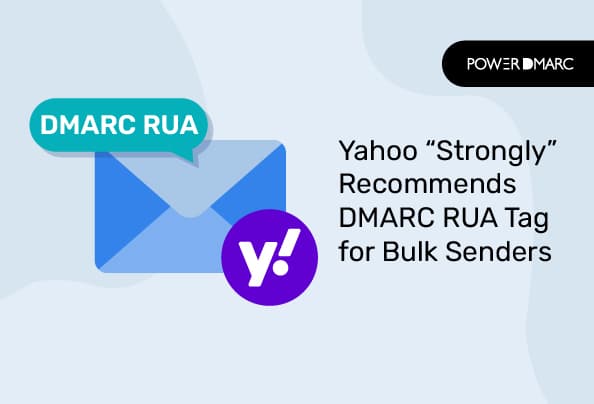Developers at Yahoo have been busy formulating guidelines for bulk senders and the DMARC RUA tag has been mentioned as a strong recommendation – so here’s all you need to know about it! Yahoo in their bulk sender guidelines for 2024 focuses on the importance of email authentication and mail flow monitoring to ensure their user receive emails only from genuine sources and subsequently reduce inbox spam.
Key Takeaways
- Monitoring email authentication results with DMARC RUA reports is essential during the initial setup phase.
- Including an accurate DMARC RUA tag can significantly enhance domain owners’ ability to monitor their email channels.
- Failure to comply with Yahoo’s email sender recommendations could lead to delivery failures by February 2024.
- Continuous monitoring is crucial not only during initial setup but also when enforcing stricter DMARC policies.
- PowerDMARC’s tools simplify the complexities of XML RUA reports, making them accessible even to non-technical users.
Yahoo Recommends DMARC RUA During Initial DMARC Setup
Yahoo’s email sender best practices document outlines the requirements for bulk senders in 2024, highlighting the importance of monitoring with DMARC aggregate RUA reports during a sender’s initial DMARC setup.
Yahoo mentions that including a DMARC RUA tag properly and without errors can help domain owners monitor their email channels during the initial stages of their email authentication journey.
Simplify Security with PowerDMARC!
How to enable the DMARC RUA Tag?
To enable DMARC RUA for Yahoo you can create and publish a DMARC record that contains the RUA tag in its syntax as shown below:
v=DMARC1; p=quarantine; rua=mailto:ruamail@company.com; pct=100;
The “rua” field contains the sender’s specified email address (ruamail@company.com) where is wishes to receive his RUA reports. You can create your DMARC record instantly for free using our DMARC record generator tool.,
After creating the TXT record for DMARC – publish this record on your DNS keeping the following in mind.
Understanding DMARC RUA Reports
DMARC RUA (Reporting URI Aggregate), simply known as DMARC Aggregate Reports, is a feature extension of the DMARC email authentication protocol that allows supporting mailbox providers to send back comprehensive XML reports on your message’s email authentication results.
Here’s a small snippet of a raw report to show what it looks like:
These reports provide a wealth of information about an email’s sending source, date of creation, IP address, SPF, DKIM, DMARC authentication results, and much more.
What happens if you fail to implement Yahoo’s Recommendations?
Yahoo clearly warns senders about the impacts of failing to comply with their recommendations and mandates, claiming that post February 2024 as enforcement rolls out in full force, non-compliant email senders may notice email delivery failures at Yahoo domains.
Continuous Monitoring For DMARC Yahoo Compliance
While Yahoo strongly encourages the inclusion of the “RUA” tag to facilitate monitoring during the initial stages of your email authentication journey, we feel that it is essential at every step! Here’s why:
Need for Monitoring at p=none Phase
As you start your email authentication journey with a DMARC setup, it is considered best practice to start with a no-action DMARC policy like p=none. At this stage, make sure you have RUA enabled to monitor your email-sending sources and deliverability rates before shifting to enforcement for maximum protection.
Need for Monitoring at DMARC Enforcement
DMARC at an enforced policy like p=quarantine or reject is not an easy feat to achieve. This is because taking strict action against emails that fail DMARC alignment may lead to your legitimate emails getting blocked or flagged as spam, causing email deliverability issues.
The solution? – Continuous monitoring with DMARC aggregate reports. Reviewing and analyzing your email-sending sources, email flows, and email behavior daily can help ensure you stay on top of any issues in deliverability.
Configure DMARC RUA Tag with PowerDMARC
The primary problem with configuring the RUA tag for emails is that your aggregate report will be sent in XML format. This requires advanced knowledge of machine-level languages like XML to decipher these reports which most of us are not familiar with, leading to missed opportunities.
PowerDMARC provides a solution to this problem! Our DMARC reader tool converts your complex XML RUA files into a simple human-readable format that is a no-brainer for even non-technical people. We help you visualize your RUA reports like no other with advanced filtering options, data arranged neatly in charts and tables, and summarized stats. Furthermore, we allow you to export your reports in comprehensive PDF/CSV format that can be shared inter-departmentally with your employees and team members.
Sign up today to get a free trial, and start monitoring your RUA data easily!
